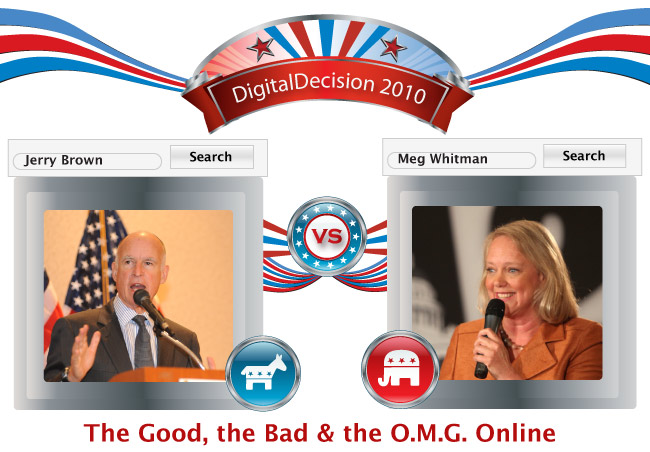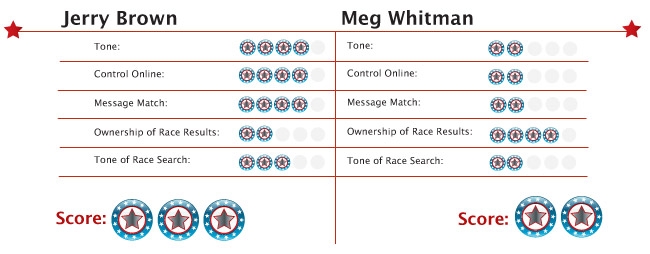
Politicians, you've got a new element in your races: your Internet search results. The same three pillars still inform most campaign perceptions--the news media, the candidate's own messaging machine and word-of-mouth (WOM). What's changed is how these pieces mash together online, interacting like never before through the real-time, democratizing power of the Web.
Previously an angry voice from the bleachers didn't go too far, maybe reaching the light of a local paper's letter to the editor. Now, one blogger can create a media maelstrom, quickly asserting search rank over a campaign's verified twitter account or homepage. Need proof? Just take a look at Santorum. Wow.
How does that ever-powerful, first page rap sheet of search engine results change the game and the popular vote in a culture that relies strongly on Google due diligence in the decision-making process?
In this space on HuffPo, and from my vantage point in the field of Web-based and Web-built reputations, I'll be lending a strictly non-partisan lens to examine two contenders each week till Election Day. Who's leading the way with Twitter, YouTube and a bells-and-whistles blog? Who scores lowest when it comes to regrettable campaign speeches broadcast through social media? Which candidates are most on the ball with their positive messaging and are most prepared to react fast to mudslinging tweets? There will be winners and losers, a bloopers reel, and lessons learned for campaign managers and politicians alike. After all, think how far we've come since television was first introduced as a serious campaign forum for Kennedy and Nixon. Unfortunately, for some of these online newbies, the stakes are much higher in the age of global connectivity and indiscriminate transparency.
Two things I'd like to make clear from the start:
1.) Our topic is the Internet and how the Internet is treating you, candidates. This column will be non-partisan, fair-handed, good-humored and hopefully helpful.
2.)When it comes to reputation management, politicians and their teams are in a league of their own. To put it in relative terms, I'd say politicians have it harder than Lindsay Lohan and Tiger. Politicians have enemies, some of whom play dirty. Politicians can be controversial. They can also be overly cautious when they should be defending themselves vigorously. They have a media-hungry electorate. These aren't easy days for political reputation management.
Let us turn now to our inaugural face-off: California's Governor Race.

What is hurting Meg's online rep and why did she trail this round? It comes down to two things: control and tone. Let's examine.
Control: Both campaigns fulfill the checklist of social media basics, what we'll call "Google insurance" for its ability to be mostly in the user's control. This includes a high-ranking campaign homepage, Twitter handles and Facebook pages.
The Achilles heal of Whitman's campaign has been this fight for control. The first thing her electorate sees when researching Whitman is news of her undocumented maid. This negative coverage rises above the Google protection her own campaign team have put in place. To put this in terms of campaigns of yesterday (i.e. pre-social media), this would be similar to blaring a candidate's public gaffe on cable at the top of the hour, every hour.
Meanwhile, Brown's current position as Attorney General grants him a lion's share of free press. He's been able to continuously land positive coverage throughout the campaign, coverage that focuses on recent accomplishments and relevant political news. His news seems to be mostly "in his control." When he does receive a negative media hit in his search results, it tends toward allegations of a lackluster and coat-tails political career. These hits have been quickly subsumed in search results by fresh, positive content.
Tone: Brown claimed this round; the sentiment analysis of his search results scores 3:1:1 neutral, positive, negative. Whitman on the other hand is 1:1:3, neutral, positive, negative. The general public and media are hungry for a story that shows any form of vulnerability or hypocrisy. This is no new phenomenon. What's different today is how pervasive and influential a story and its associated tone can become in the digital stratosphere.
Message match: The Whitman campaign has repeatedly been dinged for the large chunk of change that's been spent in advertising, marketing and branding efforts, apparently outspending Brown 86 to 1. From a reputation perspective, her campaign strategy of building up and pushing out a branded identity may make sense, particularly when one considers that her competition has easy access to positive news coverage. Until the past two weeks, Campaign Whitman had a high level of success in reinforcing her image as an ambitious and successful businesswoman. And then the gaffe about her illegal maid. And then placement in TMZ and headlines of hypocrisy. Staying on-message and branding is nearly impossible in the face of a big stumble for any candidate in the digital age.
For Brown, campaign branding is strongly matched in web search results. Press and online commentators continue to depict Brown as a long-lasting public servant. Brown has the obvious advantage here of more than thirty-five years of political messaging. He's also gaffe-free for the time being, no muddy waters to get in the way of Brown's campaign messaging.
Ownership of search results relating to the Gubernatorial Race itself is a point for Whitman. Searches for Governor of California and a multitude of similar strings lead the electorate directly to Whitman. However, it's frequently the volume of negative press associated with the Whitman campaign that is driving this link in search and results. Ownership of the Governor search term ends up hurting the campaign's online rep in the end.
The popular vote, online and off, is still to be determined. Today's status quo can be upended in two clicks of a YouTube video download. As things stand today online, based on dynamic monitoring and reputation analysis by the technology and team at ReputationDefender, we call Brown as the strong reputation favorite for now.